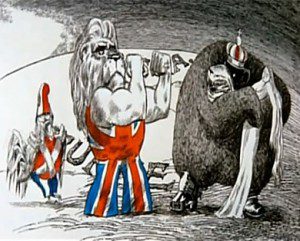*this is a guest post by Konstantinos Travlos, currently a Visiting Assistant at Georgia Southern, who writes on international conflict and history. The arguments presented below are based on past research.
Russian policy towards Ukraine is partly driven by short term political reasons such as protecting an investment in the form of Yanukovych, the Russian view of Ukraine as a “little brother”, a legitimate worry over the future of the Russian minority in Ukraine, and a very real opposition to what is seen by the Kremlin elite as the meddling of Western powers in its Near Abroad. However, I argue that the most intractable issue driving Russia is control of access to the Crimean Peninsula as a naval base, an indivisible territorial issue. This has less to do with geopolitical and strategic reasons and more to do with the identity of the Russian state as a great power which makes Crimea a transcendental and thus difficult to negotiate over. This is why the recent and quick escalation is not surprising, in counter to some arguments made. 
Control of the Crimean Peninsula was a central target of the policy of the Russian Czars who believed that Russia must become a European Power. Peter I the Great, Anna Ioannova , and Catherine the Great waged war against the Ottoman Empire and its Tartar suzerain for control of the peninsula and its environs. This policy was partly due to a wish to put a stop to the slave raids lunched by the Crimean Tartars in Russian controlled lands, and especially against the Cossacks, whose loyalty the Muscovite throne saw as paramount for its struggle with Poland-Lithuania. However, it was also driven by a more transcendental goal. Control of the Crimea, like control of the Gulf of Finland was seen as a sine no qua for the claim that Russia was a Western power, in turn, key for the Russian claim of preeminence over the question of the disposition of the Polish-Lithuanian Kingdom. It is no coincidence that just like Peter the Great founded St. Petersburg as a powerful signal of the western ambitions of his empire, so Catherine the Great founded Sevastopol once she annexed the Crimean.
Control of the Crimea permitted Russia to project naval power in the Mediterranean which in turn solidified its position as a preeminent Great Power. During the French Revolutionary and Napoleonic Wars, the United Kingdom and Russia established a naval condominium in the Eastern Mediterranean, and afterwards Russian Naval power out of Sevastopol permitted the Russian state to influence the resolution of issues such as the Greek Revolution, the two Eastern Crises of the Ottoman Empire, and the political dynamics of the Danubian principalities. It also gave Russia a possible stranglehold over the economic life of the Austrian Empire. It would not be an exaggeration to say that the treatment of Russia as a Great Power by the other European powers was a result of the double forts-arsenals of Kronsdat and Sevastopol.
The preeminent role of Sevastopol as the linchpin of Russian demands that its interests and views on eastern-Mediterranean issues be accommodated by the other powers was something that English decision makers became keenly aware of. Especially the growing anti-Russian group that became centered around the person of the Viscount Palmerstone. It is a gross simplification to say that the British Empire entered the conflict that would become the Crimean War with the goal of denying Russia the Crimean and St. Petersburg. However as the war progressed, the anti-Russian war-party came to dominate the decision making process, especially with the premiership of Palmerstone. As a result British strategy became focused on destroying the fort-arsenals of St. Petersubrg and Sevastopol and thus denying Russia the power projection capabilities that had made it a Western Great Power.
In the end this goal was not attained due to an unwillingness of France, Austria and Sweden to go along Palmerstone’s maximalist goals. Sevastopol was taken, and Admiral Napier showed the vulnerability of St. Petersburg to a naval attack, but absent the Swedish and Austrian troops needed for a land campaign, the spoils for the United Kingdom were modest. While the Treaty of Paris deemed Russia had to give up Sevastopol as an arsenal, and cease maintaining war-ships in the Black Sea, the Russians simply moved the facilities and navy to the Sea of Azov. Even this small of a setback constrained Russian policy. Russian influence in Greece and the Ottoman Empire was severely curtailed, and Russia was completely unable to influence such events as the Second War of Italian Unification. Only with the Russo-Turkish War of 1877 and the Treaty of Berlin did Russia gain again its full access to the Black Sea. This in turn opened up the way for Russian influence in the Balkans and the need for the western powers to consult with it as equals on issues of the Eastern Mediterranean such as the Cretan Issue, the disposition of Cyprus and so on.
The point of this little romp through history is that for both empirical and transcendental reasons, control of the Crimea is one and the same as the identity of Russia as a European Great Power and a Western nation. The treatment of Russia as a great Western power by the other powers varied with its control of Sevastopol. Until such a time as that identity is divorced from that empirical fact, or no longer relevant, no Russian government will tolerate a loss of Crimea. In the mental picture of the Russian state, a loss of the Crimea will lead to a loss of leverage in international politics, which will lead to a loss of equal treatment by the Western powers, which will lead to a loss of the claim to a Western identity.
Thus the recent events in Ukraine cast a long shadow over Russia’s self-identity as a great European power, since it raises the specter of a loss of the Crimea. What does this mean for crisis management? If the goal of the western powers is peace then they must work under the constraint imposed by the transcendental character of the Crimea for Russia. No pacific resolution to his crisis that does not somehow accommodate Russian demands for influence or control over the Crimea is possible
While the Ukrainian government can also claim that the Crimea is necessary for the identity of Ukraine as an independent state, such a claim is not as salient as the Russian one. It should be remembered that the Crimea only recently was made part of Ukraine (1954 by Soviet dictate), and historically was never part of it. Indeed it was where the Ottoman-Tartar threat to Ukrainian populations emanated from, one of the sources of “the Other” if you will for Ukrainian identity. If the goal of the western powers is peace, and the goal of the new Ukrainian government is to avoid Russian domination, then the Crimea will have to be given a special status at the very least. Seeing as the broad autonomy status Crimea enjoys today does not seem to be enough to placate Russian fears few options are still available. I fear that the reality is that the Crimea as a part of the Ukraine will always be one area over which Kiev will have conditional control and not true sovereignty. Any resolution that ignores this transcendental issue will not be successful or stable in the long term. Just how much is Crimea worth to the West? When dealing with the Russian state, this is indeed a “third-rail of politics”.
Valeriano serves as the Donald Bren Chair of Military Innovation at the Marine Corps University.His work also includes serving as a Senior Fellow at the Cato Institute and as Senior Advisor to the Cyberspace Solarium Commission.


0 Comments